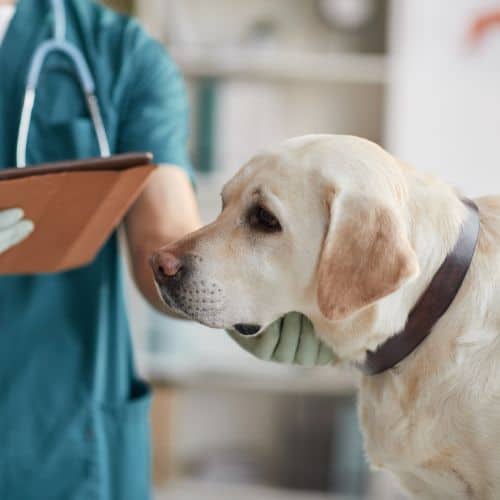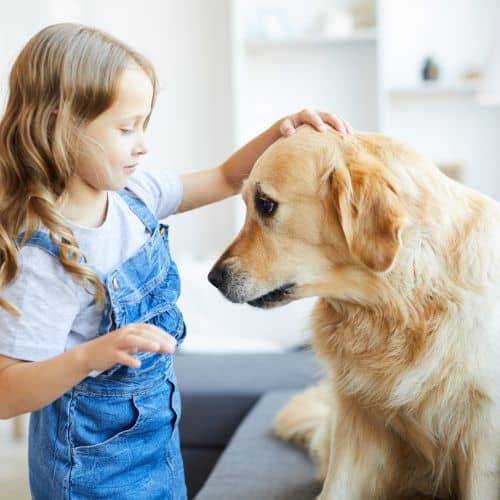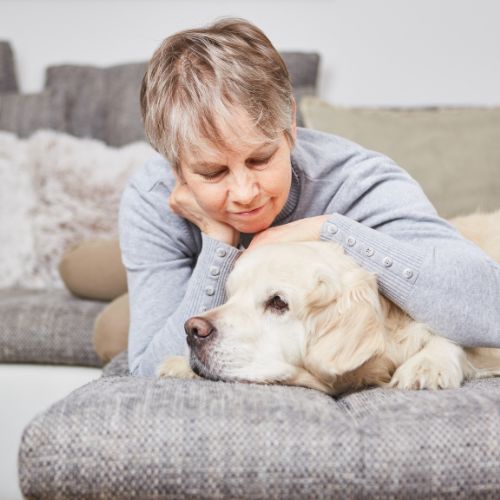How to Deal with the Anticipatory Grief of a Pet
Dealing with the anticipatory grief of a pet can be a difficult and emotional experience. It’s natural to feel overwhelmed and uncertain about how to cope with the impending loss of a beloved companion.
Anticipatory grief is a common response to the knowledge that a pet’s life is coming to an end, and it can be just as intense as the grief experienced after the pet has passed away.
It’s important to remember that you are not alone during this time. Many pet owners experience anticipatory grief, and resources are available to help you navigate this challenging time. This article will provide tips and strategies for dealing with the anticipatory grief of a pet.
By taking proactive steps and seeking support, you can find comfort and peace as you say goodbye to your beloved companion.
Understanding Anticipatory Grief
Anticipatory grief refers to the feelings of sadness and loss that can arise when a pet owner knows their pet is dying or will soon pass away. It is a natural part of the grieving process when a pet’s death is expected. Some key points about anticipatory pet grief include:
- Anticipatory grief can involve emotions like sadness, anxiety, loneliness, fatigue, anger, and guilt.
- Pet owners may start grieving their pet’s expected loss while it is alive.
- Anticipatory grief allows pet owners time to prepare emotionally for their pet’s death.
- Ways to manage anticipatory pet grief include spending quality time with the pet, talking to friends about feelings, participating in memorial activities, and working through guilt/regret.
Anticipatory grief is a type of grief that occurs before the actual loss. It is a very common experience for pet owners who know that their pet is terminally ill or has a limited lifespan. Understanding anticipatory grief can help you prepare for the loss of your pet and cope with the emotions that come with it.
Recognizing the Signs
Anticipatory grief can manifest in different ways. Some common signs of anticipatory grief in pet owners include:
- Increased anxiety or worry about the pet’s health
- Preoccupation with the pet’s well-being
- Feelings of sadness or depression
- Difficulty sleeping or concentrating
- Changes in appetite or weight
- Withdrawal from social activities
It is important to recognize these signs and seek support from friends, family, or a therapist if needed. Anticipatory grief can be a very isolating experience, but you are not alone.
Preparing for the Loss

Preparing for the loss can help you cope with the anticipatory grief and make the process more manageable. Here are some tips to help you prepare emotionally and practically for the loss of your pet.
Emotional Preparation
It is important to acknowledge your feelings and emotions during this difficult time. Here are some ways to help you prepare emotionally:
- Talk to someone: Reach out to a friend, family member, or a support group to share your feelings and emotions. Talking to someone who understands what you are going through can be a great source of comfort.
- Take care of yourself: Make sure you care for your physical and emotional needs. This can include getting enough sleep, eating well, and engaging in activities that bring you joy.
- Create a tribute: Consider creating a tribute to your pet, such as a photo album or a memorial. This can help you honor your pet’s memory and provide a sense of closure.
Practical Considerations
In addition to preparing emotionally, there are also practical considerations. Here are some things to consider:
- Financial planning: Consider the costs of end-of-life care and burial or cremation. Planning can help alleviate some of the stress and burden during this time.
- Prepare your home: Make sure your home is safe and comfortable for your pet during their final days. This may include setting up a comfortable space and ensuring they have access to food and water.
- Prepare for the aftermath: Consider how you will handle your pet’s belongings after they are gone. This may include deciding what to do with their toys, bed, and other items.
By preparing emotionally and practically for the loss of your pet, you can help make the process more manageable and find comfort in knowing that you have done everything you can to honor your pet’s memory.
Coping Mechanisms
Dealing with the anticipatory grief of a pet can be a difficult and emotional experience. Coping mechanisms can help you manage your feelings and find comfort during this time. Here are some coping mechanisms to consider:
Seeking Support
Talking to others who have gone through similar experiences can be helpful. Consider joining a support group or seeking out a therapist who specializes in pet loss. Surrounding yourself with people who understand your feelings can help you feel less alone.
Creating Memories
Creating memories with your pet can be a meaningful way to cope with anticipatory grief. Consider taking photos, making a scrapbook, or recording videos of your pet. These memories can help you remember the joy and love you shared with your pet.
Self-Care Strategies
Taking care of yourself during this time is important. Try to maintain a healthy routine by eating well, exercising, and getting enough sleep. Engage in activities that bring you joy and help you relax, such as reading, listening to music, or spending time in nature.
Remember, coping with anticipatory grief is a process that takes time. Be patient with yourself and allow yourself to feel your emotions. With time and support, you will find comfort and peace.
Communicating with Family

When dealing with the anticipatory grief of a pet, it’s important to communicate with your family members. Here are some tips to help you communicate effectively:
Discussing with Children
Children may not fully understand what’s happening to their pet. It’s important to talk to them in a way that they can understand. Be honest with them and explain that the pet is sick and may not get better. Encourage them to express their feelings and ask questions.
It’s also important to prepare them for the pet’s death. Let them know that it’s okay to be sad and that everyone will be grieving. Explain what will happen when the pet dies, such as burial or cremation.
Involving Other Pets
If you have other pets, they may also be affected by the sick or aged pet’s condition. They may become anxious or depressed. It’s important to involve them in the process and give them a chance to say goodbye.
Allow your other pets to spend time with your pet if possible. This can help them understand what’s happening and say their goodbyes.
Remember that every animal is different, and some may not behave as you expect. Be patient and understanding with your other pets as they grieve.
Effective communication can help your family members and pets cope with the anticipatory grief of a pet. Use these tips to help everyone understand what’s happening and support each other during this difficult time.
Considering Euthanasia
One of the toughest decisions you may have to make is whether or not to consider euthanasia for your beloved pet. This is a deeply personal decision that should be made with careful consideration and consultation with your veterinarian.
Making the Decision
When considering euthanasia, it is important to evaluate your pet’s quality of life. If your pet is experiencing chronic pain and suffering or has a terminal illness, euthanasia may be the most humane option. However, it is important to remember that this decision is ultimately up to you and your family.
Before making a decision, discussing your pet’s condition with your veterinarian may be helpful. They can provide you with information about your pet’s prognosis, treatment options, and the euthanasia process. Discussing your feelings and concerns with a trusted friend or family member may also be helpful.
Understanding the Process
Euthanasia is a painless and peaceful procedure that a veterinarian performs. Your pet will be given a sedative to help them relax, and then a medication will be administered to gently stop their heart.
You may choose to be present during the procedure, or you may prefer to say goodbye to your pet beforehand. After the procedure, you will have the option to take your pet’s remains home with you or have them cremated.
Remember, euthanasia is a difficult decision, but it is also a compassionate one. It allows your pet to pass peacefully and without suffering. Take the time to consider your options and decide what is best for you and your pet.
Aftercare for Your Pet
After your pet has passed away, it’s important to take care of their remains and find ways to remember them.
Memorializing Your Pet
Memorializing your pet can be a helpful way to cope with their loss. Here are a few ways you can honor their memory:
- Create a memorial: You can create a memorial in your home or yard to remember your pet. This can include a photo, a plaque, or a special spot where you can go to remember them.
- Make a donation: Donating to an animal charity or shelter in your pet’s name is a great way to honor their memory and help other animals in need.
- Plant a tree: Planting a tree in memory of your pet can be a beautiful way to remember and watch them grow.
Handling Remains
Handling your pet’s remains can be a difficult and emotional process. Here are a few options for handling their remains:
- Cremation: Cremation is a popular option for handling pet remains. You can keep their ashes in an urn or scatter them in a special location.
- Burial: If you bury your pet, follow local laws and regulations. You can also choose to bury them in a pet cemetery or on your property.
- Memorial jewelry: Some people turn their pet’s ashes into memorial jewelry, such as a necklace or bracelet.
Remember that there is no right or wrong way to handle your pet’s remains. It’s important to do what feels right for you and your family.
Personal Healing
Dealing with the loss of a pet can be a difficult and emotional process. It’s important to take the time to focus on your own personal healing during this time. Here are some ways to help you cope with your anticipatory grief:
Allowing Grief
It’s important to allow yourself to grieve the loss of your pet. This can be a difficult process, but it’s important to acknowledge your feelings and allow yourself to feel them fully. Don’t try to suppress your emotions or pretend that everything is okay. Allow yourself to cry, talk about your feelings, and express your emotions in a healthy way.
Finding Closure
Finding closure can be an important part of the healing process. This can include creating a memorial for your pet, such as a photo album or a special place in your home where you can display their belongings. You may also find comfort in writing a letter to your pet, expressing your feelings and memories.
It’s important to remember that everyone grieves differently and there’s no right or wrong way to cope with the loss of a pet. Take the time to focus on your own personal healing, and don’t be afraid to seek support from friends, family, or a professional counselor if you need it.
Frequently Asked Questions

What are some strategies for coping with the impending loss of a pet?
There are several strategies you can use to cope with the impending loss of a pet. One of the most important is to take care of yourself. This means getting enough rest, eating well, and exercising regularly. You may also find it helpful to talk to someone about your feelings, whether that’s a friend, family member, or therapist. Additionally, it can be helpful to create a support network of people who understand what you’re going through.
How can one emotionally prepare for the death of a beloved pet?
Emotional preparation for the death of a beloved pet can involve several things. One is to spend quality time with your pet, doing the things you both enjoy. You can also create a memory book or scrapbook of your time together. Another way to prepare emotionally is to talk to your veterinarian about what to expect as your pet’s health declines. This can help you mentally prepare for what’s to come.
What are thoughtful anticipatory grief gifts to offer someone facing the loss of a pet?
There are several thoughtful anticipatory grief gifts you can offer someone facing the loss of a pet. One is a personalized photo album or memory book. You can also offer to help with practical tasks, such as taking the pet to vet appointments or helping with grooming. Additionally, you can offer emotional support, such as listening to the person’s feelings or offering to spend time with them and their pet.
What are some ways to manage the stress of caring for an aging or terminally ill pet?
Caring for an aging or terminally ill pet can be stressful, but there are several ways to manage that stress. One is to create a routine for your pet’s care, which can help you feel more in control. It’s also important to take breaks and practice self-care, such as taking a walk or reading a book. Additionally, you can reach out to support groups or online communities for people in similar situations.
How can one handle the mixture of emotions during the pre-loss period of a pet?
Handling the mixture of emotions during the pre-loss period of a pet can be challenging, but there are several things you can do. One is to acknowledge and validate your feelings, whether they are sadness, anger, or something else. It can also be helpful to talk to someone about your emotions, whether that’s a friend, family member, or therapist. Additionally, you can focus on the positive memories you have with your pet and make the most of the time you have left together.
What are appropriate ways to support someone anticipating the loss of a pet?
There are several appropriate ways to support someone anticipating the loss of a pet. One is to offer emotional support, such as listening to the person’s feelings or offering to spend time with them and their pet. You can also offer practical support, such as helping with grooming or taking the pet to vet appointments. Additionally, you can offer to create a memory book or scrapbook of the person’s time with their pet.







